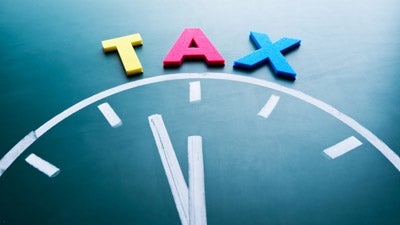Home > Finance > Tax and Accounting >
Do You Owe the IRS a Quarterly Tax Payment August 15?
By: 1800Accountant

This weekend, more than a few small business owners will be scrambling to pull together the documents and information they need to meet the IRS deadline that’s coming up in just six days. Yes, there’s a tax deadline for quarterly taxes due to most states and the IRS on August 15.
Do you owe the IRS a quarterly tax payment on August 15?
If you are an independent contractor or profitable small business, you are probably facing an IRS deadline for a quarterly estimated tax payment, and you could be facing a tax deadline for your state as well.
Even if you aren’t profitable, you may still be facing a tax deadline next week, with an IRS deadline to file quarterly reports showing that you are not profitable.
Do I Have to Pay Quarterly Taxes?
You will have to make estimated tax payments to the IRS if you are:
- A freelancer, independent contractor, or self-employed individual who expects to owe $1,000 or more when you file your annual return.
- A corporation that expects to owe $500 or more.
Four times a year (quarterly), you are required to pay the IRS enough of your revenues to cover your income tax and your self-employment tax (Social Security and Medicare) obligations.
The rules for estimated tax payments for sales taxes, business and franchise taxes (note that you don’t have to own a franchised business in order to owe a state franchise tax—it’s what some states call the business tax charged to all businesses), and local and state income taxes in your home state may be different.
So check your state’s laws—or talk with an experienced tax accountant who understands the rules for small business—in order to avoid problems.
There is a penalty for underpaying the estimated tax. But the IRS has a safe harbor rule: if you pay at least as much as your previous year’s liability or pay within 90 percent of your actual tax liability, there is no penalty for underpayment.
Calculate and Make Estimated Tax Payments
The IRS website has an Estimated Tax Guide that provides an overview for small business owners and freelancers or independent contractors. While it is helpful, it’s important to remember that it’s general information that may or may not apply directly to your business.
Each business situation is different—especially if you are a new entrepreneur with a start-up business, or a newly self-employed individual—so spending some time with a tax advisor can be a big help in understanding the best way to calculate what you owe.
There are three calculation methods that you might be able to use:
- If you are a freelancer or self-employed individual, use Form 1040-ES—the same form used to pay estimated taxes. It includes a worksheet that helps you calculate your quarterly estimated tax payment. If you are a corporation (LLC, S or C Corp, and certain types of farms and associations), use Form 1120-W to calculate estimated taxes. This method calculates your total projected tax liability for the year, and divides it into four payments.
- If you have been in business for more than a year, you can refer to the federal tax return from last year to calculate your current year estimated taxes. In the calculations be sure to include all the income and deductions you expect to take, and refer to the total tax you paid so that your estimated tax payments 100-110% of the amount you paid last year.
- If you are a seasonal business, or a freelancer or independent contractor facing fluctuating or cyclical income, you might prefer to calculate your estimated taxes on a quarterly basis. This requires that you calculate your taxes based on real income, deductions and expenses—not projections—and can be more time consuming than the other methods. But it can also allow you to make smaller payments in some quarters when cash flow is lower.
This article was originally published by 1800 Accountant
Gary Milkwick is Vice President at 1800Accountant.com, a tax preparation and consulting firm based in New York City that serves thousands of small business owners. Gary previously worked with Fortune 500 clients at PricewaterhouseCoopers, and with a regional accounting firm in Atlanta, Georgia that provides tax and consulting services to small business owners.
Gary earned B.S. of Accounting and Master of Accountancy degrees from Brigham Young University and an MBA from UCLA’s Anderson School. He holds Series 7 and 66 securities licenses. He is a licensed CPA with the Personal Financial Specialist designation in New York and Georgia.
Published: August 13, 2013
2140 Views
2140 Views














